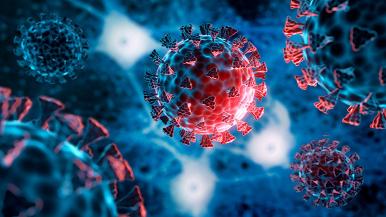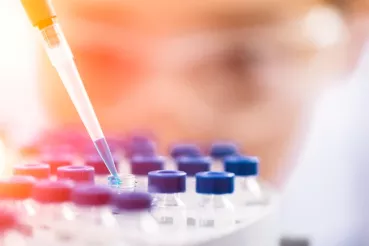The notorious spike protein of SARS-CoV-2, the virus that causes COVID-19, caused lung cancer cells to die in laboratory studies conducted by researchers at RUSH University Medical Center, who recently published their findings in the journal Cancers. The discovery raises the possibility that the pandemic that has afflicted the globe for three years might also yield a treatment for lung cancer, and perhaps other cancers as well.
The coronavirus infects human cells when its spike protein, known as S1, attaches to a molecule on the cell surface called angiotensin-converting enzyme 2. ACE2, as it’s called for short, is a beneficial enzyme that plays a key role in the regulation of blood pressure and other cellular processes.
The level of ACE2 also increases in people with cancer, including lung cancer, and studies have found that modifying ACE2 levels may help control lung cancer growth. The involvement of ACE2 in both cancer progression and coronavirus infection prompted the RUSH researchers to investigate the use of the spike protein against the disease.
“It is always important to find mechanisms to stimulate cancer cell death and stop the progression of cancer,” said Kalipada Pahan, PhD, the Floyd A. Davis professor of neurology at RUSH Medical College and lead investigator of this study. He adds that anecdotal cases of people with lung cancer that improved after they developed and recovered from COVID-19 also suggest the coronavirus’ potential as an unlikely ally against cancer.
Cancer is the number two cause of death in U.S., second only to heart disease, according to Centers for Disease Control and Prevention. Despite recent advances in treatment, lung cancer is by far the leading cause of cancer deaths throughout the world — more than 130,000 people die of it each year in the U.S. alone. Lung cancer accounts for 25% of cancer deaths in the U.S., more than deaths from colon cancer, breast cancer and prostate cancer combined.
Using a commercially available cloned version of the spike protein, Pahan and his colleagues first tested the protein’s effect on the most treatment-resistant and deadliest form of lung cancer, non-small cell lung cancer, or NSCLC. In petri dishes, they combined the spike protein with human NSCLC cell cultures and measured the resulting levels of the proteins and molecules involved in cancer cell growth, compared with untreated NSCLC cells.
They found that in the NSCLC cells combined with S1, the spike protein induced apoptosis — the programmed death of cells that’s a routine process in an organism’s development. Accordingly, spike treatment decreased the levels of a molecule known as Bcl-2 that is needed for cell survival, and it increased the level of a molecule named BAD that is required for cell death. “Cancer cells do not die from apoptosis due to high level of Bcl-2 and low levels of BAD,” Pahan said.
The researchers then examined the results of administering the spike protein to mice with established lung cancer. One group of mice received the spike protein in a mixture with saline solution that was sprayed into their nostrils every other day, while a control group received normal saline solution as a placebo.
After four weeks of spike protein treatment, the mice were euthanized and autopsied. The researchers found the number and size of tumors decreased in the mice that received the spike protein, and higher levels of tumor cell death, compared to the control group.
“If these results are replicated in lung cancer patients, it would uncover an encouraging avenue of treatment of this devastating disease.” Pahan said. “Intranasal spike S1 protein could be used for late-stage lung cancer when there’s no other therapy to stop the progression.”
Pahan and his team currently are seeking partners to study the use of the spike protein in clinical trials of human patients with lung cancer. Since most of the widely available vaccines for COVID-19 target the spike protein, one of the important questions future studies will need to answer is whether vaccination diminishes the protein’s efficacy as a cancer intervention.
Other researchers involved in this study are Monica Sheinin and Brian Jeong from the Graduate College of RUSH University and Ramesh K. Paidi, PhD, from the medical college’s Department of Neurological Sciences.




